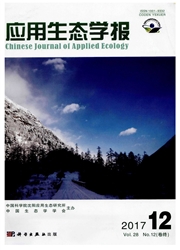

 中文摘要:
中文摘要:
本文以人参为研究对象,基于人参分布点位数据和22个气候环境因子数据,运用Bio Mod2平台10个物种分布模型对当前我国东北地区人参潜在生境分布进行预测.以受试者工作特征曲线(ROC)为权重集成10个模型的模拟结果,构建组合模型,并基于该模型预测了IPCC第五次评估报告中RCP 8.5、RCP 6.0、RCP 4.5和RCP 2.6等4种排放情景下21世纪50和70年代人参潜在分布范围.结果表明:在基准气候条件下,人参适宜生境面积占研究区总面积的10.4%,此类地区主要分布于研究区东北部长白山地区以及小兴安岭东南部区域的森林地带.在未来不同的排放情景下研究区人参的适宜生境变化显著,总体上分布范围将有一定程度的缩小.同时参与建模的10种模型在统计学精度、预测结果以及变量权重上都有差异.模型精度计算结果表明,MAXENT模拟效果最好,GAM、RF和ANN次之,SRE模拟精度最低.本文构建的组合模型在一定程度上提高了现有物种分布模型的预测精度,从而使模拟效果更优.
 英文摘要:
英文摘要:
This study utilized Panax ginseng as the research object. Based on BioMod2 platform, with species presence data and 22 climatic variables, the potential geographic distribution of P. gin- seng under the current conditions in northeast China was simulated with ten species distribution model. And then with the receiver-operating characteristic curve (ROC) as weights, we build an ensemble model, which integrated the results of 10 models, using the ensemble model, the future distributions of P. ginseng were also projected for the periods 2050s and 2070s under the climate change scenarios of RCP 8.5, RCP 6, RCP 4.5 and RCP 2.6 emission scenarios described in the Special Report on Emissions Scenarios ( SRES ) of IPCC ( Intergovernmental Panel on Climate Change). The results showed that for the entire region of study area, under the present climatic con- ditions, 10.4% of the areas were identified as suitable habitats, which were mainly located in north- east Changbai Mountains area and the southeastern region of the Xiaoxing' an Mountains. The model simulations indicated that the suitable habitats would have a relatively significant change under the different climate change scenarios, and generally the range of suitable habitats would be a certain degree of decrease. Meanwhile, the goodness-of-fit, predicted ranges, and weights of explanatory variables was various for each model. And according to the goodness-of-fit, Maxent had the highest model performance, and GAM, RF and ANN were followed, while SRE had the lowest prediction accuracy. In this study we established an ensemble model, which could improve the accuracy of the existing species distribution models, and optimization of species distribution prediction results.
 同期刊论文项目
同期刊论文项目
 同项目期刊论文
同项目期刊论文
 期刊信息
期刊信息
